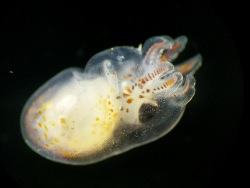The Primorsky Aquarium welcomes its first baby giant Pacific octopuses

The female laid several thousand eggs in mid-August, the first babies began to emerge five months later, and now they number in the dozens.
“In the wild, the incubation period of octopus eggs lasts from three to six months, depending on temperature; in our tank it is constantly at -10°C, which provides optimal conditions for the egg mass development,” explained Yuri Nekotinev, Lead Specialist at the Department of the Russian Far East Marine Organisms. “Fertilization occurred not at the Aquarium: when the female arrived here last May, she was already inseminated. In octopuses, eggs do not get fertilized right after mating – the female may store the male's spermatophores in her body for a long time, waiting for proper conditions; at the Aquarium we were able to continue the natural cycle and to breed the species.”
Throughout the incubation period a female not only protects her clutch but also cares for it, keeps it aerated and removes the dead eggs. An octopus arm bears several hundreds of highly sensitive suckers, and a female uses them to inspect each egg for any damage and contamination as well as to shake the sand grains off it.
“Our female groomed her egg clutch for about a month and a half but, seemingly, the sticky substance the octopus attaches the eggs with is unsuitable for adhering to glass, and the egg clusters began falling off the tank wall that is why I had to collect them to keep separately,” said Yuri Nekotinev. “I sorted the eggs according to their development stages, placed them into different tanks, and during the rest of the incubation period, almost daily, I picked over and cleaned the egg mass, and I still continue doing it because not all babies have hatched.”
In nature, octopuses stop eating after they lay eggs. While tending them, a female loses up to 70% of her body weight and eventually dies of starvation. The Aquarium’s female has not refused food but she prefers only live scallops for dinner.
“Giant Pacific octopuses are difficult to raise in an artificial setting for the simple reason that they have a very long embryonic development stage and a very long planktonic stage which begins right after baby octopuses hatch, and this planktonic stage is the most crucial one,” explained Oleg Katugin, Ph. D., Biology, one of Russia’s leading experts in cephalopods. “The key problem is that young octopuses are extremely gentle creatures, and it is not until they settle on the ocean floor and take up a benthic existence that they start developing a skin which is more resistant to environmental exposure. Prior to that, it is necessary to create conditions that would minimize their contacts with the tank walls and objects inside the tank. Once baby octopuses touch something, they get injured, and the affected skin areas are contaminated with bacteria immediately after the injury.”
Upon hatching, a tiny octopus has to fend for itself. Despite newborns being no more than a few millimeters long, they are full-blown, though miniature, predators – they can change their colour and prey on small crustaceans. Another reason due to which the attempts at rearing giant Pacific octopuses in aquariums nearly always fail is their complex nutritional needs. At the Primorsky Aquarium the babies are offered a diet of various-sized brine shrimp.
General information:
— The giant Pacific octopus (Enteroctopus dofleini) is also known as the giant octopus and the North Pacific giant octopus.
— In this species, the mantle may measure up to 60 cm in length, and the arm-span can be more than 3 meters.
— The giant Pacific octopus is a benthic species tending to inhabit coastal areas to depths of up 180 meters.
—A total of four benthic octopus species are found in the waters off Primorye. In addition to the giant Pacific octopus, these include the chestnut octopus (Octopus conispadiceus), the marbled octopus (Amphioctopus aegina) and Benthoctopus profundorum, a species of deep-sea octopus.
— Octopuses have an amazing regenerative ability: they can regrow a lost arm, and one missing arm is sometimes replaced with two new ones.